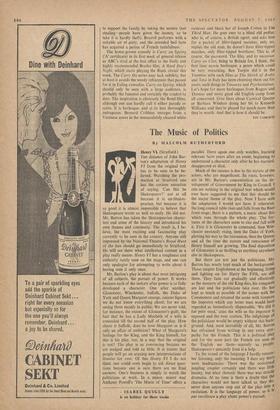The Music of Politics
By MALCOLM RUTHERFORD Henry VI. (Stratford.)
THE distance of John Bar- ton's adaptation of Henry VI from the original text has to be seen to be be- lieved. Watching the pro- duction at Stratford one has the curious sensation of saying, 'Can this be Shakespeare?' not at all because it is un-Shakes- pearian, but because it is so good it is almost impossible to believe that Shakespeare wrote so well so early. He did not. Mr. Barton has taken the Shakespearian charac- ters and some of the history and introduced his own themes and continuity. The result is, I be- lieve, the most exciting and fascinating play currently to be seen in the country. Anyone still impressed by the National Theatre's Royal Hunt of the Sun should go immediately to Stratford. He will see there what intellectual content in a play really means. Henry VI has a toughness and authority rarely seen on the stage, and one can only apologise for attempting to write about it having seen it only once.
Mr. Barton's play is about that most intriguing of all subjects, the pursuit of power. It works because each of the seekers after power is so fully developed a character. One after another, Gloucester, Winchester, Suffolk, the Duke of York and Queen Margaret emerge, sinister figures we do not know everything about, for we are seeing them mainly in public. We are never told, for instance, the extent of Gloucester's guilt; the fact that he has a Lady Macbeth of a wife is concealed till the second half of the play. How clever is Suffolk, does he love Margaret or is it only an affair of ambition? What of Margaret's feelings for the King, and the King himself, for this is his play, too, in a way that the original is not? The play is so convincing because we are nudged and told so little. It is truism that people will go on arguing new interpretations of Hamlet for ever. Of this Henry VI I do not think one could even begin to ask direct ques- tions because one is sure there are no final answers. One's business is simply to watch the politicians at work. In a minor, minor way Anthony Powell's `The Music of Time' offers a parallel. There again one only watches, learning relevant facts years after an event, beginning to understand a character only after he has married, disappeared or died.
Much of the success is due to the stature of the actors, who are magnificent. Its roots, however, are in Mr. Barton's concentration on the de- velopment of Government by King in Council. I can see nothing in the original text which would ever have suggested to me that this should be the major theme of the play. Now I have seen the adaptation I would not have it otherwise. the long council table rises and falls from the floor front-stage; there is a pattern, a music about this which runs through the whole play. The for- tunes of the characters seem to rise and fall with it. First it is Gloucester in command, then VVin- chester enviously rising, then the Duke of York, plotting his way to the succession, then the Queen, and all the time the stature and conscience of Henry himself are growing. The final deposition of Gloucester is as thrilling as anything anywhere, else in Shakespeare.
But there are not just the politicians. MI% Barton has wisely kept much of the background: Those simpler Englishmen at the beginning, living and fighting on for Harry the Fifth, are still there. They fade out gradually and effectively as the memory of the old King dies, his conquests are lost and the politicians take over. He has kept as much as possible of the scenes with the Commoners and retained the scene with Simpcolt the impostor which any lesser man would bave regarded as immediately dispensable. 'We did it for pure need,' cries the wife as the impostor is exposed and the rout scatters. The infightings of the politicians would be empty without this back- ground. And, most incredibly of all, Mr. Barton has refrained from writing in any extra synv pathy for the French. This is a political plaY and for the most part the French are seen as the English see them—scarcely as people. Shakespeare's unsaintly Joan is a help. . To the sound of the language I hardly remernJ ber listening, only the meaning. I dare say there were inadequacies. There was the occasional jangling couplet certainly and there was little beauty, but what rhetoric there was was strictlY dramatic. At no time is there a doubt that the characters would not have talked as they do; never does anyone step out of the play into a, recitation. It is the language of power, as it is par excellence a play about power's pursuit.






























 Previous page
Previous page